Three years into his government, President Alberto Fernández defends the honesty of Cristina Fernández de Kirchner, his vice-president, denouncing that “this justice system serves Cambiemos,” Argentina’s opposition force.
Aspiring to a unified exchange rate, the Frente de Todos leader speaks of his “personal and very close” relationship” with Economy Minister Sergio Massa and says the two are planning a “calmer Argentina economically” for 2023.
You have just completed the third year of your term. If you were not the president and had to draw the balance of the three years of Alberto Fernández in government, what would you say?
That this Alberto Fernández has run across a uniquely difficult time in the world. When this is all over, history will write that in the first two years of his four-year term, he had to undergo a pandemic and in the last two a war, a war with infinite international repercussions which has meant many problems for Argentina. Furthermore, he had to face those four years after receiving a country absolutely in debt with 54-percent inflation, a country where real wages had fallen 20 percent and where 23,000 PyMES (small and medium-sized firms) had closed down with the consumer economy absolutely paralysed since the previous two years.
I would say that it’s all about a president who put all his effort, all his guts and all his convictions into it, obtaining good results but with problems still to be resolved three years later. He managed to get the economy going, being after Néstor Kirchner, the only president who managed to have Argentina growing three years running during his four-year term, who has created until now 1.5 million jobs with registered employment growing by a monthly 0.5 percent, who mobilised the regional economies and well with record exports but who, of course, has problems, chiefly inflation, which affects many people.
Your government is characterised by having traversed the pandemic and the outbreak of war in Europe amid disagreements within the ruling coalition, inflation and the loss of purchasing-power but also with positive economic indicators, as you mentioned with sustained growth since 2021, recovery of formal employment, etc., which are not reflected in the social mood. How much did the internal disagreements between you and the vice-president mark your administration?
I attach little importance to it, quite honestly, not because it’s unimportant but because it’s good and necessary that we get on well. But what we have had is the seeds of discord being permanently sown by a media system which never wanted to take those important data into account. This system always injected discouragement into Argentine society, an absolutely negative outlook on Argentina. We had an ex-president who is now going around the world saying that Argentina is a country without a future…
The problem was this media attitude of hiding the important things in Argentina. They filled their front pages calling for vaccines and then when Argentina ended up being the country with the greatest immunity, that was never published, never made the front pages of those newspapers.
How do you feel about being dismissed as the puppet, front man or straw doll of the vice-president?
Let’s agree on one thing, when we fall out, I’m supposed to be the puppet but the truth is that if we have differences, that is precisely because I am not. I’m someone who loves and respects Cristina [Fernández de] Kirchner greatly but I am Alberto Fernández. I have my own outlook and vision, I value and respect hers above all else but necessarily we do not think the same on some things. At this time I’m the president and the one who has to make the decisions. So every time I’m asked that question, I say: “Let’s agree on this, if I get on badly with Cristina, how come I am then her puppet? Why should Cristina get annoyed with me if I do everything she asks?” There must be another reason then for our not seeing eye to eye.
So to what do you attribute that contradiction in the outlook regarding you?
To many media installing from the very first day the idea that Cristina was going to make me her puppet. But I want to be frank because I don’t want to lie. Cristina, who knows me, never wanted to make me her puppet because she knows that’s not me. So it’s not as if Cristina tried and failed.
The surprise exit of Martín Guzmán from the Economy Ministry triggered one of the most difficult moments of your presidency.
That was clearly an unpleasant moment because Martín was somebody very important to me and a minister who did his stuff very well, but in Argentina you live in vertigo and he had a hard time withstanding the speed of that vertigo.
What happened, he just couldn’t take it?
I think he was fed up, that’s what he said. But why should I answer if that’s what he says?
So you would have preferred him to continue.
I’d have preferred him to continue, sure.
What truth is there of a loan of US$15 billion from the Central Bank or Treasury of Brazil, once Lula becomes president, joining the currency swap of US$5 billion with China?
I must confess that we haven’t talked to [Brazil President Luiz Inácio] Lula [da Silva] about that until now. But we have talked a lot with the government of President [Jair] Bolsonaro and his Economy Minister [Paulo] Guedes about the idea of forming a single Central Bank and, just as we have the currency swap with China, of seeing how we can have some better mechanism of commercial relations with Brazil. I think that is something we must do and perhaps now with Lula that we can do.
But Brazil’s reserves are over US$350 billion so US$15 billion is nothing for them whereas in the case of Argentina it would produce a Copernican change in the direction of macroeconomic stability.
We must wait for January 1 and the arrival of Lula and then we’ll see how we proceed.
In this same series of interviews, AFIP tax bureau chief Carlos Castagneto said that with the agreement to exchange tax information with the United States he estimates the detection of around US$100 billion in undeclared assets there and that via some system, whether collecting fines or a whitewash, he could net an income tax of 35 percent, something equivalent to paying off almost all the debt with the International Monetary Fund. What expectations do you have regarding that?
I have great expectations. I thank the US government warmly for acceding to our request and I value enormously the work of [Economy Minister] Sergio Massa in that sense because when Sergio proposed it to me, I said: “Go for it, I don’t know if we’re going to get it.” And he did. And the truth is that it was admirable work. Now we have to detect who has funds in the United States without declaring them in Argentina. The numbers in circulation are different and the truth is that I have no certainty as to what sum we are really talking about. What I do know is that in this globalised world all the measures tending to whitewash financial operations are good for the world. And in this case good for Argentina where certain sectors have a natural tendency to place their assets abroad. It is very good to know what they have abroad, not so that they cannot have it but so that they can express their true wealth and pay the corresponding taxes.
Is there any possibility of, whether by a successful whitewash or a loan from Brazil, accumulating a quantity of funds permitting the exchange market to be viably unified and a more solid plan against inflation to be launched?
We’re working to unify the exchange market and we want to get there, of course we do. It wasn’t us who created all this because a large part was inherited. It is true that due to the pandemic we had to come out with that solidarity dollar and the other things we did in the pandemic due to our lack of dollars. But we must work in that direction and all our efforts run along those lines. And, of course, all the things you mention will help a lot to achieve that objective. And it also helps a lot that Argentines understand that we need those dollars to bring in inputs and to continue increasing production and jobs in Argentina rather than for pleasure and diversion or even – if you will allow me – savings. Because today you can save in pesos with clauses or conditions permitting your savings to rise with the dollar so that your investment never shrinks with respect to the dollar.
Regarding a stabilisation plan, we’re working on that. The plan for prices which Sergio has implemented via the Trade Secretariat aims in that direction. The question becomes: Are they thinking of a shock plan? Shock plans, when we reviewed them in hindsight, always meant devaluation and more loss of income for the weakest sectors, which is why we are so reluctant to try them out.
Now are the dollars you said, the dólar Qatar, the dólar soja all a process of sectoral devaluation leading to exchange rate unification?
We should have a single exchange market. When Néstor was the president, we had one, as did Cristina during both her terms. What happened, I insist, is that we received a Central Bank without dollars. Between my winning the election and becoming president, some US$25 billion fled Argentina. In that context the pandemic gripped us. The reconstruction of the reserves has cost us a lot despite our record exports this year – we also have record imports because Argentine production has not stopped. We grew 10.3 percent last year and this year we will grow around six percent, already giving us a base from which to grow next year. So it must be understood that we have made an enormous effort but the lack of dollars is a problem and our duty is to seek the way in which the dollars are destined precisely towards filling that gap.
So you are expecting in the last year of your government to be able to unify the exchange market?
Yes, that is what I would want most.
On the morning of December 5, the chats and audios of judges, prosecutors, the City Hall Security minister and businessmen and directors of Grupo Clarín meeting up in Lago Escondido came out in all the newspapers and you made a nationwide broadcast. Apart from lodging criminal charges against those people, including the two top executives of Grupo Clarín, how does your relationship with Clarín now stand, that is if you had one recently?
If truth be told, we had no relationship with Clarín, close or otherwise, during my government, that is the reality. We did not lodge those charges trying to persecute Clarín.
But rather all of them.
What we saw makes me sick, there’s no other way to explain it. It makes you sick to see judges, prosecutors and officials mixed up in that kind of plot, even if it is true that we have all gone presuming what happened, we never saw it out in the open. We’ve never seen anything like it.
The charges I ordered to be levied have nothing to do with the chats, they have to do with the trip because the trip presupposes the crimes of accepting handouts and malfeasance. That’s what I asked to be investigated, I did not denounce the chats. The chats serve to highlight that the facts occurred and that what they were looking for were mechanisms to gain impunity for the crime they had committed. Now when you read of the judges forging and predating invoices and discussing who pays and the businessman says: “We’ll handle that because it’s our duty,” it’s all so disgusting. The episode does not bother me on account of any of the people who participated, nor the Clarín newspaper. It bothers me because I’m a democrat and in my Peronist blood there also flows a bit of the blood of Raúl Alfonsín. And if we respect the rule of law, we cannot look at what we have just seen without reacting because democracy is built on the basis of the three branches of government. We need honest judges and officials and incorruptible businessmen and what we have seen is the complete opposite.
Am I wrong or didn’t one of the judges who travelled try a similar case of accepting handouts and even convict?
You’re not wrong, it was the judge [Julián] Ercolini who sent Cristina’s case to trial but he also sent [former Transport secretary] Ricardo Jaime to trial for accepting handouts. What was being investigated? Two weekends in Brazil in a private plane. Who had paid for the private aircraft and the two weekends? This is the same case as we have proved up to here.
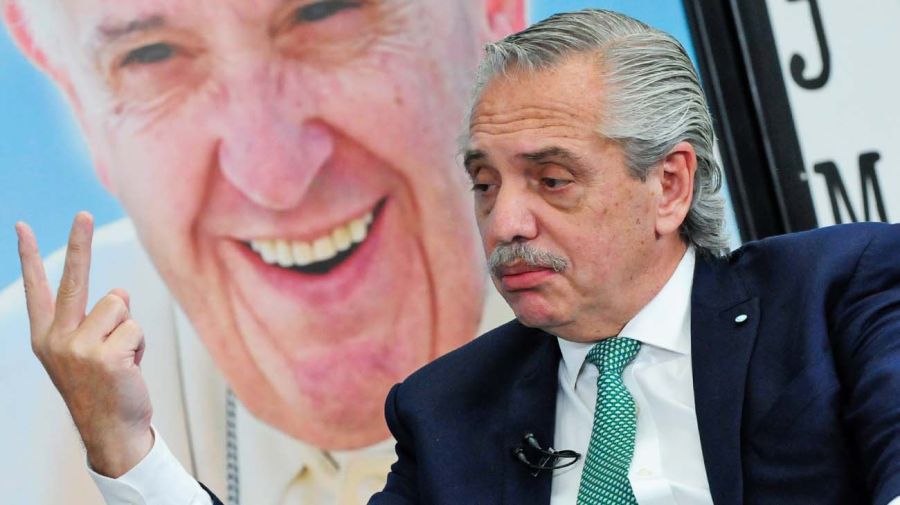
Why has Kirchnerism historically cast a suspicious eye on your relationship with Clarín, Mr President?
Because they constructed a story at the time that I was a friend of Clarín and if truth be told, I never had any links with Clarín. In all the years Cristina was president, I never saw Héctor Magnetto, that is the reality. I saw him when I won the election. I had never seen him before but they constructed that image.
Within that other ideological spectrum regarding your former chief advisor Julián Leunda, who was also involved in the chats during that Lago Escondido weekend when he guaranteed that information on the trip would not come out on the C5N news channel, he had previously been the institutional relations director for Grupo Indalo. Is it proper for the institutional relations director of a media group to afterwards advise the Presidency?
To the degree that he cuts ties with that media group, yes. But I see that he didn’t, that’s why he resigned. I regret very much what happened to Julián, he’s a young man who I think has a future and of whom I am still fond. But he fell into the trap which they set for him in the sense that they did indeed call him to ask for help and he did not measure the consequences nor remember his place. He was no longer the manager of institutional relations, he was my chief advisor and he made a mistake. I also appreciate that he presented his resignation without me needing to ask for it. He saw it as I saw it and that gives me a certain calm.
The next day did you doubt at any point that a national broadcast was the necessary mechanism? Could there have been other ways of placing it on the agenda and highlighting what you wanted to underline?
That Sunday when I read Horacio Verbitsky’s article, I immediately sat down to write the speech which I afterwards gave. My doubt was how to transmit it because since Cristina’s verdict was due the next day, I did not know how it was going to be used. But what made me determined to go ahead with the nationwide broadcast was seeing on Monday morning that none of the media were talking about the issue. It’s not that they were not talking about the chats, they were not covering the trip. In my speech I did not mention the chats, I spoke about the trip and that struck my attention very powerfully. None of the newspapers spoke of the trip and when I entered into the portals, none of the major media in the Internet except for Perfil and El Destape were talking about it. I then realised that there was a kind of omerta code of silence so I said to myself: ‘How do I break this?’ And the only way to break it was a national broadcast so that’s what I did.
Can you assure us that nobody linked to the government or AFI intelligence services participated in the hacking which gave rise to those messages?
Absolutely. In the years of the Alberto Fernández government I have pledged to put an end to the underground strata of democracy, pulling all the spies out of the courtrooms and prohibiting domestic intelligence. If you read today’s AFI reports, they talk to me about Russia and Ukraine, about the conflicts in the European Union and elsewhere in the world. Nobody speaks to me about what you or any other journalist is up to, nor any opposition politician. I never used any agency, I never used AFIP to pressure any of my critics, I never did it and I’m not going to. I can guarantee you that what happened was not the result of hacking by a state institution.
Judge Ercolini was a student of yours…
He assisted my lectures.
Assisted your lectures. And what was your view of Ercolini beforehand and, if different, what is your view today?
Ercolini has said some incredible things as a judge. I haven’t spoken to Ercolini for many years. I stopped talking to him when I was no longer talking to Cristina because of the things he wrote in the cases of [former Attorney-General Alejandra] Gils Carbó and [Grupo Indalo businessmen] Cristóbal López and Fabián De Sousa. When he ordered the arrest of Cristóbal López and Fabián De Sousa arguing that they could sell their assets, I called him up and told him: “I don’t know where you studied law” because to freeze assets there are injunctions, you do not need to arrest people. To detain a person so that they cannot sell their assets and hold them for over a year is a judicial disgrace and abuse which I had never seen before. When he sent Cristina – with whom I was not on speaking terms at the time – to trial saying that she was guilty because she had sent a budget containing public works benefitting Lázaro Báez to Congress and afterwards promulgated it, I called him and told him: “I cannot believe what I am reading.”
Was your assistant Ercolini different from the judge today? I would imagine that if you had him as a lecture assistant...
Yes, I definitely do not recognise this Ercolini. Even within the University od Buenos Aires they should ponder very seriously whether to keep him on as a teacher. It’s not justice with this Ercolini, it’s something else. Of course I don’t recognise him. And I want to be frank, I also know [Buenos Aires City Security Minister] Marcelo D’Alessandro and have always got on very well with him. I don’t understand what he was doing there and I don’t understand what those judges were doing there. I don’t understand how they could stain the justice system doing what they did. It seems so very serious to me what has happened because what one sees is the impudence and impunity with which they moved around and bought out people.
You also supported the vice-president’s decision to challenge the judge María Eugenia Capuchetti. What is your view of the federal judges of Comodoro Py? Is Ercolini an exception?
The exception is [Daniel] Rafecas. The exception is María Servini [de Cubría]. The exception is [Sebastián] Casanello. Those are the good federal judges.
What happened if the judicial reform which you promoted got stuck in Congress and was never debated?
Very easy to answer, it is the Cambiemos people who benefit from such judges and do not wish to touch them. This justice system serves Cambiemos.
How is your relationship with Cristina Fernández de Kirchner?
It’s fine, I retain a sincere affection for Cristina. And in these circumstances which she is undergoing, she knows that she can count on me unconditionally and when I say that, I mean in human terms. But all the things I say about her trial and the accusations against her, I say them as a man of the law and not to defend her. I say them because it torments me to think that Argentina has to live with a judicial system like this.
Mr President, you repeatedly say that you would never fight again with Cristina but when I ask you the same question once a year, you tell me that your relationship with her is very good. But what emanates from your circle and the vice-president’s indicates distance, even not talking to each other for a significant amount of time.
A while ago, you asked me if I was a puppet of Cristina. I told you that it seems not because Cristina gets annoyed with some of the decisions I make, so I must not be making the decisions which Cristina wants, so that it is very possible that this generates some degree of distance. But that does not change my affection nor respect nor my first obligation as a president to maintain the unity of Frente de Todos, for which I work tirelessly as my duty.
Did the vice-president’s decision to announce that she would not be a candidate of any kind take you by surprise?
All that is premature. I greatly respect Cristina’s decision, what she is telling the courts is: “I’m not going to look for privileges, I’m letting you know that I’m not afraid of any of you trying to put me in prison.” I exalt that courage and give it enormous value. But Cristina is very important to Frente de Todos.
What you are saying is that doubts must be raised as to her not being a candidate.
I wouldn’t dare to say that because her word is her word and I would not place that in doubt. What I’m saying is that this message also contains a subliminal message which nobody analyses. It would seem that the message is: “I’m stepping down from all the candidacies.” The message is that I’m going to fight as a simple citizen, as a private soldier the consequences of the judicial absurdities which you have caused.
Do you believe, then, that the announcement that she will not be a candidate might be the result of that emotion and that afterwards she might review that decision?
Cristina is a very rational person so it is very possible that she had already made that decision. What I say is that we live in very vertiginous times. We must let time go by bearing in mind that she is an innocent person responding to a six-year prison sentence. All that also counts.
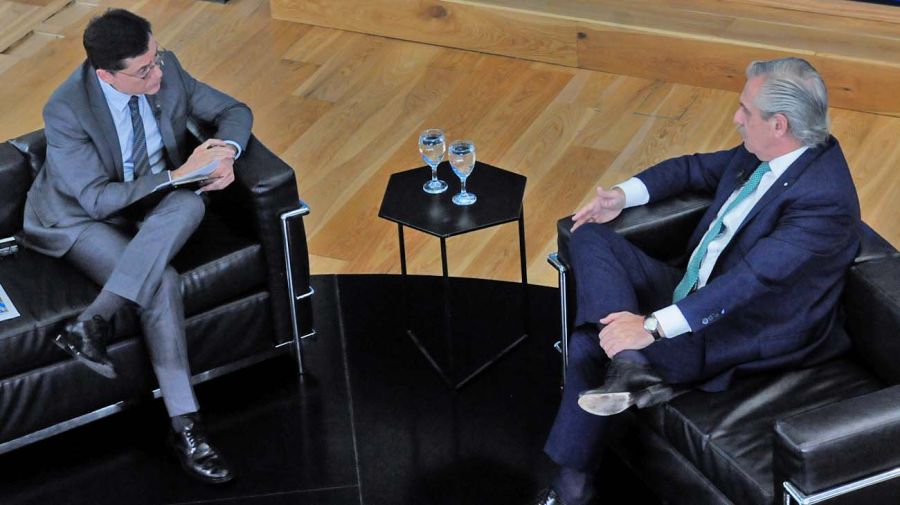
Independent of the Santa Cruz highway contract trial, various accusations of corruption have been made against all three Kirchnerite governments and even Macri’s, but not yours. What is your reflection there?
When somebody governs, they delegate many tasks to people and you cannot have permanent control over what those people do. I’ve gone to a lot of trouble so that we can advance in a climate of absolute transparency. I’d also like to clarify that this government is also Cristina’s and I’ve never had from her a request that I should not act this way. Quite the contrary.
You are talking about what you never had when you were Cabinet chief ...
This government, of which I am president, is also Cristina’s. If there has been no corruption in this government, Cristina also forms part of it and she never blocked my decision to act this way, never. And she never expressed the least wish to favour or benefit anybody, never. If we give a place to the value of honesty in this government, as you do, it is also in Cristina’s head.
Let me come back to your respected Néstor Kirchner, Cristina Fernández de Kirchner and Mauricio Macri, they have all faced corruption charges and at the same time they are people who have, or who had in the case of the one who died, an important fortune while you don’t. What does it mean to have a poor president?
I’m not a poor president, I’m a middle-class president, a middle-class lawyer who has worked many years for the state and some years in his profession with the possibility of having a nice house in Callao and Alvear, which I could buy – with my own money – and the possibility of having a nice office in Callao and Posadas as well as a car. Like [Uruguayan ex-president José] ‘Pepe; Mujica, I really did not go into politics thinking of my personal business like Macri, nor of benefitting my friends because I respect my business friends very much but never let them influence me for their benefit.
I correct the question: in relative terms compared to your predecessors, your assets are those of a poor person. Do you really think that during the Kirchnerite governments there were never any irregularities which could be taken to court?
No, not to my knowledge, if I had known about it, I would have denounced it without the slightest hesitation and removed from their post whoever was responsible.
I’m referring to the times of Néstor and Cristina Kirchner.
I cannot say because Cristina Fernández de Kirchner herself has spoken about [former Public Works secretary] José López.
And the other secretary of Néstor Kirchner with US$80 million?
I cannot say. I can say that while I was an official, I may not have noticed things of that nature. And what I cannot say is that nothing happened because when a guy runs around at 4am chucking a bag with US$9 million over a convent wall, it all becomes very difficult to explain. But what I can say is that Cristina can be the object of many criticisms. I’ve been very critical of Cristina and I have my differences with her but what is unfair is to accuse her of being dishonest because she is not dishonest and I’m sure of what I’m saying. I never saw her participate in practices of that type.
Since Sergio Massa became minister, the idea has expanded that he manages the economic decisions and that you and the vice-president respectively accompany and take their distance from those decisions. Is that fiction or reality, is the minister Massa overrated?
Sergio arrived at a very difficult moment for the government, of that there can be no doubt. He is doing and has done his stuff very well. He’s working very seriously in all the decisions he makes like when he came to me proposing to sign this agreement with the United States. I said to him: “Are you going to pull this off? If so, go for it.” All his decisions like that one have been consulted with me and I’m very satisfied with his work and very grateful to him for taking charge at such a difficult moment. Now the decisions are mine in the final analysis. The soy dollar is my decision too. He spoke to me and explained why and it sounded reasonable to me. I have the best and very close personal links with Sergio, he’s very easy for me to work with.
If Massa is doing so well, would he then surface as a competitor for you in 2023 or would he boost your own re-election?
That doesn’t worry me, what worries me least at this moment, believe me, is my own re-election. My main concern is to see how we can end up setting Argentina back on a steady course. And if I were to be the candidate, that would have to be because I was the most competitive and in that case, so be it, but I’m not going to be an obstacle to Frente de Todos winning, we are going to guarantee that Frente wins. Whereby everything is very premature.
What I will say is that it is worth making this reflection – as from December 10 we are starting to celebrate the 40th year of democracy, a democracy which has given many solutions to people but also often fallen short. These 40 years of democracy should be a good opportunity for all of us to be capable of constructing a series of minimum points permitting us to see how Argentina is going to be in the years to come because Argentina has enormous opportunities for those years.
Now that Cristina Fernández de Kirchner has announced that she will not be a candidate for anything, independent of any possible speculation that it might not be so, but now that it is confirmed that she will not run, does that boost the idea of you as the natural Frente de Todos candidate?
I don’t know but nor do I want to think that Cristina is not going to be a candidate. I don’t know because I’m not speculating with that, believe me, because I see what is happening in the world. Every morning when I wake up, my telephone is full of the bad news happening in the world and in Argentina. What I have to do is resolve those problems, I have to think of the Argentines. I’ve dedicated three years of my life up to here making life better for Argentines in a highly complex scenario. I’m not thinking of my election.








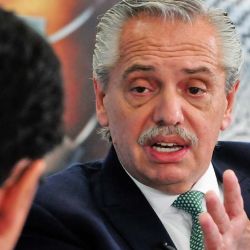
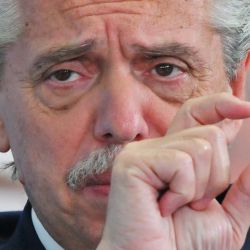
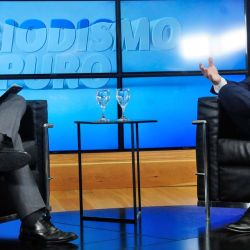
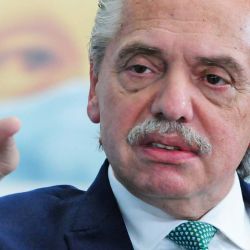


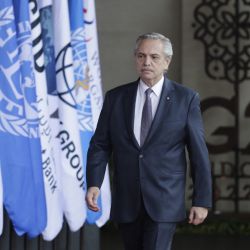
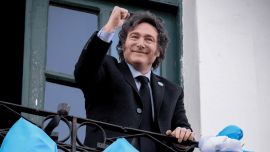











Comments